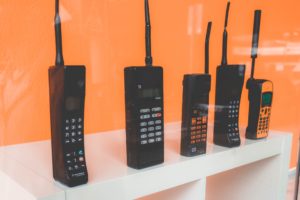- People above Machines
- Faces before Screens
- Grand Challenges ahead of Small Conveniences
Trend for 2015: The Internet of Things
The Internet of Things (IoT) is a new world of computing which could change the world as we know it. The definition of Internet of Things is basically the idea of communications technology becoming embedded in everything we need, want, and buy.
Literally everything could become connected, from heart monitoring implants, to alarm clocks, to chips inserted into humans in order to track them or even let them enter through secure doors! IoT technology will be the language of the future, giving everyday items the ability to communicate with each other to carry out activities on our behalf. The possibilities are endless and it’s already started.
With self-driving cars, thermostats that can set your home to a certain temperature before you get back, and the much anticipated “smartwatches” already in existence the IoT has begun. With the IoT comes several positives – we can use it ourselves to measure the atmosphere around us, keen green fingers can use it to quickly analyse soil conditions, and much more. It can also be used to control infrastructure by use of sensors, bridges could open for large ships and cargo trucks could even get themselves from A to B saving on money and human power. It will greatly benefit many businesses as they can effectively rationalize their operations by replacing people with machines. Many so called “undesirable” jobs can be completed by machines leaving humans more leeway to pursue a more desired career.
It will also make our daily lives comically safe. Data collecting chips can be inserted to monitor your heart rate and general health, allowing health professionals to know everything about you. Gadgets around the home can alert you to a fire more quickly than a smoke alarm, automatically contact emergency services, and call your neighbours in case you’re unconscious. Cars will be fitted with sensors that stop you getting too close to another car and will monitor your speed to ensure everyone is driving at a safe speed. This is a “worrywarts” dream, though on the other hand I can’t help thinking it will eventually remove any excitement from day to day life! However these are a few of the good things about internet of things.
This evolution will bring humans out of an age of privacy, into an age of transparency. The big “datasphere” could potentially know more about you than you know yourself. Your every move and motion could be tracked! Of course issues arise with the safety of all this data. We are aware that people can hack into our information today so to shrink that risk better security measures need to be put in place and you, the consumer, need to find using them as easy as locking your house door when you pop out for a pint of milk. But with the ever growing popularity of the cloud, come ever growing and adapting cloud security measures to ensure the safety of our data. One obvious downside of making everything based on electrical circuits is the need for fail-safe design of these systems. If we have everything attached to the grid then we need standby systems for when the grid fails as it surely will. Think of the great blackout in the North-Eastern USA in 2003; entire nations could be rendered helpless when we can’t do things without the internet.
Ultimately, however, will it not just make us lazy? We could be just like the humans in Pixar’s movie Wall-E, who just sit and float around on chairs with everything done for them with the push of a button. Although that sounds delightful for a few days I’m not sure it’s practical or appropriate for a full lifespans or indeed for a full life, but maybe this is a very extreme outcome of something which should have more potential to improve life than halt it.
So some may call me sceptical, (I prefer wise) but it is always important for us to think of the consequence of our actions. Once we get passed the excitement of not having to go to the tedious effort of lifting a finger to turn on the coffee machine, we start to think that maybe we don’t want people knowing everything about us and there is no excitement in being 100% safe. Speaking as a marketing specialist, I like the idea that the IoT will allow me to gather as much data as possible to find potential clients. However, as an individual I am enormously uncomfortable at the thought of anonymous corporations harvesting all this information about me.
However I also recognise the possibilities that come with it. The internet has already changed the world we live in and improved the lives of millions across the globe. It would be nice to live in a faultless world so just increasing the scope of coverage could potentially bring more happiness. Ultimately I think we just need to remember 3 things from this TEDx talk in order to keep a handle on the possibilities of the IoT and maybe even a handle on current life:








